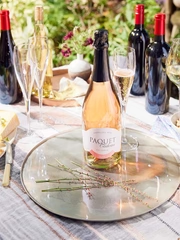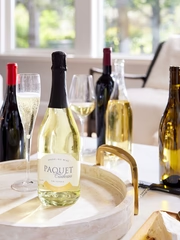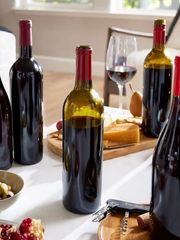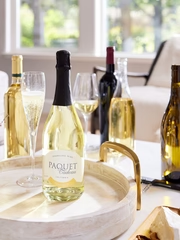How to Enhance Your Tasting Experience
Some of you would like to get better at tasting wine. Some of you are now confident enough that you would like to share your knowledge with your friends and family. Perhaps some of you are looking for a different way to share wines with your wine aficionado friends. No matter what your motivations are, I would like to share some simple, straightforward tools to help you achieve these goals.

Last August, during our 2015 National Convention, I gave a presentation centered on self-expression and self-empowerment in the world of senses and wine tasting to our Independent Wine Consultants. We all have the same weapons, but we need to train ourselves to unleash their power. We are all looking for new fun ways to experience tasting wine.
The first step is always to observe, analyze and guess what a wine is telling us. For example, color can be very telling of the consistency, weight or mouthfeel of a wine. A light color will most certainly equal a light body and fruit-forward style of wine. A dark, deep color indicates rich structure, tannins and longer ageing potential. A golden color in a white wine can indicate ageing or sweetness, and can sometimes be indicative of specific varietals.
All your senses are being put to work. Write down and try to express with words what is in the glass. Use what is in your fridge, the smell or colors of your grandpa's farm, the grocery aisle at Kroger’s or the flowers in your garden.

Wine can sometimes be hard to describe. One way to simplify this process is to use familiar descriptors. Use images, tastes and visual references that you know well and are comfortable with, and most importantly, that make you confident enough to express and share with anyone.
The following image illustrates several basic smells and tastes that we have all probably encountered once before in our life. The trick here is to train our senses and our brain to remember them when they come around again.

The next step in this quest is to describe these sensations and perceptions again on paper, but this time using images for each component.

A sensation is a physiological process, it is not conscious. The sense of smell provides odors. Perception follows a sensation and the brain starts analyzing. We are using images to interpret and the images will be very unique and personal. Rarely will you have two identical drawings of a wine within a group tasting.
If you do not find violet, plum or earthy aromas in your Malbec, or if you cannot quite sense honey, pear or peach flavors in your favorite Pinot Grigio, it is certainly not the end of the world. The ultimate goal is to gain more and more confidence each time you take a sip and have fun enjoying wine.
Click here for the WineShop At Home Tasting sheet, which can be used during your own Wine Tasting with your Wine Consultant.
- by WineShop At Home Winemaker, Alex Reble
 Last August, during our 2015 National Convention, I gave a presentation centered on self-expression and self-empowerment in the world of senses and wine tasting to our Independent Wine Consultants. We all have the same weapons, but we need to train ourselves to unleash their power. We are all looking for new fun ways to experience tasting wine.
The first step is always to observe, analyze and guess what a wine is telling us. For example, color can be very telling of the consistency, weight or mouthfeel of a wine. A light color will most certainly equal a light body and fruit-forward style of wine. A dark, deep color indicates rich structure, tannins and longer ageing potential. A golden color in a white wine can indicate ageing or sweetness, and can sometimes be indicative of specific varietals.
All your senses are being put to work. Write down and try to express with words what is in the glass. Use what is in your fridge, the smell or colors of your grandpa's farm, the grocery aisle at Kroger’s or the flowers in your garden.
Last August, during our 2015 National Convention, I gave a presentation centered on self-expression and self-empowerment in the world of senses and wine tasting to our Independent Wine Consultants. We all have the same weapons, but we need to train ourselves to unleash their power. We are all looking for new fun ways to experience tasting wine.
The first step is always to observe, analyze and guess what a wine is telling us. For example, color can be very telling of the consistency, weight or mouthfeel of a wine. A light color will most certainly equal a light body and fruit-forward style of wine. A dark, deep color indicates rich structure, tannins and longer ageing potential. A golden color in a white wine can indicate ageing or sweetness, and can sometimes be indicative of specific varietals.
All your senses are being put to work. Write down and try to express with words what is in the glass. Use what is in your fridge, the smell or colors of your grandpa's farm, the grocery aisle at Kroger’s or the flowers in your garden.
 Wine can sometimes be hard to describe. One way to simplify this process is to use familiar descriptors. Use images, tastes and visual references that you know well and are comfortable with, and most importantly, that make you confident enough to express and share with anyone.
The following image illustrates several basic smells and tastes that we have all probably encountered once before in our life. The trick here is to train our senses and our brain to remember them when they come around again.
Wine can sometimes be hard to describe. One way to simplify this process is to use familiar descriptors. Use images, tastes and visual references that you know well and are comfortable with, and most importantly, that make you confident enough to express and share with anyone.
The following image illustrates several basic smells and tastes that we have all probably encountered once before in our life. The trick here is to train our senses and our brain to remember them when they come around again.
 The next step in this quest is to describe these sensations and perceptions again on paper, but this time using images for each component.
The next step in this quest is to describe these sensations and perceptions again on paper, but this time using images for each component.
 A sensation is a physiological process, it is not conscious. The sense of smell provides odors. Perception follows a sensation and the brain starts analyzing. We are using images to interpret and the images will be very unique and personal. Rarely will you have two identical drawings of a wine within a group tasting.
If you do not find violet, plum or earthy aromas in your Malbec, or if you cannot quite sense honey, pear or peach flavors in your favorite Pinot Grigio, it is certainly not the end of the world. The ultimate goal is to gain more and more confidence each time you take a sip and have fun enjoying wine.
Click here for the WineShop At Home Tasting sheet, which can be used during your own Wine Tasting with your Wine Consultant.
- by WineShop At Home Winemaker, Alex Reble
A sensation is a physiological process, it is not conscious. The sense of smell provides odors. Perception follows a sensation and the brain starts analyzing. We are using images to interpret and the images will be very unique and personal. Rarely will you have two identical drawings of a wine within a group tasting.
If you do not find violet, plum or earthy aromas in your Malbec, or if you cannot quite sense honey, pear or peach flavors in your favorite Pinot Grigio, it is certainly not the end of the world. The ultimate goal is to gain more and more confidence each time you take a sip and have fun enjoying wine.
Click here for the WineShop At Home Tasting sheet, which can be used during your own Wine Tasting with your Wine Consultant.
- by WineShop At Home Winemaker, Alex Reble





